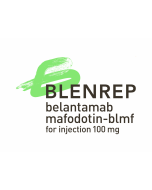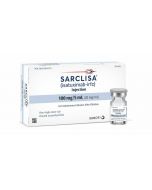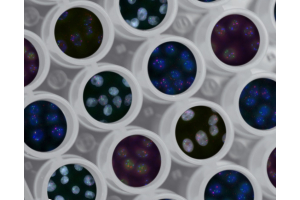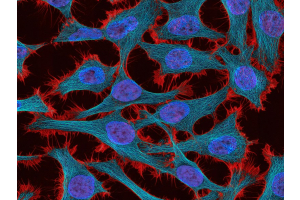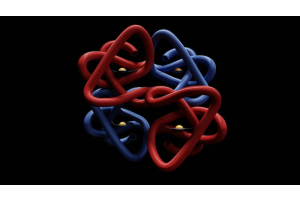New Multiple Myeloma Treatments 2022
Last updated: 13 November 2023

You can legally access new medicines, even if they are not approved in your country.
Learn more »What is Multiple Myeloma?
Multiple myeloma is a type of bone marrow cancer. Bone marrow is the soft tissue inside bones that produces the body's blood cells, including a type of white blood cell called plasma cell. Plasma cells play an important role in the immune system: they produce antibodies that help the body fight off germs.1,2
In multiple myeloma, plasma cells grow and divide out of control. Because of this big increase in cells in the bone marrow, there is less space for normal blood-forming cells. The tumor can also interfere with cells that help keep bones strong. Rather than producing working antibodies, the myeloma cells make abnormal antibodies, which cannot protect the body against infections.1,2
What are symptoms of Multiple Myeloma?
Some patients with multiple myeloma have no symptoms, especially at an early stage of the disease. Symptoms a patient may have are:1,2
- Bone pain, usually in the back, ribs or hips
- Bruising and unusual bleeding
- High blood levels of calcium
- Weak bones that break easily
- Nerve damage
- Blurred vision, dizziness or headaches – caused by thickened blood (hyperviscosity)
- Kidney problems
- Repeated infections
Treatment for Multiple Myeloma
There are different multiple myeloma treatment options. Treatments of multiple myeloma can help relieve pain, control complications of the disease, stabilize the body and slow the progress of the cancer.2,3
The main treatments for Multiple Myeloma include:2,3
- Drug therapy
- Radiation therapy
- Surgery
- Stem cell transplant
- CAR T-cell therapy
- Supportive treatments
- Targeted therapy
- Immunotherapy, which uses the body’s immune system to fight cancer
- Chemotherapy drugs for multiple myeloma, which uses drugs to destroy cancer cells
- Corticosteroids, which regulate the immune system to control inflammation in the body
- Bone marrow transplant, also known as a stem cell transplant, which replaces cancerous bone marrow with healthy bone marrow
- Radiation therapy, which uses high-powered energy beams from sources such as X-rays and protons to kill cancer cells.
In addition to a multiple myeloma treatment regimen, other treatments may be needed to help relieve some of the symptoms caused by the condition. For example radiotherapy to relieve bone pain or dialysis in case the patient develops kidney failure.2,3
Is there a cure for Multiple Myeloma?
No. Unfortunately, there is no cure for multiple myeloma. Drugs for multiple myeloma may help to control symptoms and improve quality of life. This has been done in many patients for years.3
Multiple Myeloma treatment side effects
These treatments can each cause side effects and complications. Side effects from multiple myeloma treatment drugs can be short term and go away after treatment is finished, or they may be long term. The type of side effects caused by multiple myeloma therapy depends on the type of treatment, the stage and grade of disease. Your oncologist will give you advice about which treatment is best for you.1,2
What are new treatments for Multiple Myeloma?
There are several approved new drugs for Multiple Myeloma. Here are some of them:
Pepaxto (melphalan flufenamide)4,5
Pepaxto (melphalan flufenamide) is an alkylating agent (chemotherapy) used in combination with dexamethasone to treat adult patients with multiple myeloma (MM) that has become refractory to 3 main types of medicines (proteasome inhibitor, immunomodulatory agent, CD38 inhibitor) and who have received at least 4 prior therapies. This type of cancer is also called relapsed and refractory multiple myeloma (RRMM).
Pepaxto (melphalan flufenamide) was approved for the treatment of adults with RRMM by:
- The Food and Drug Administration (FDA), USA, on February 26, 2021.
Blenrep (belantamab mafodotin-blmf)6,7
Blenrep (belantamab mafodotin-blmf) is a anti-BCMA (B-cell maturation antigen) therapy for adult patients with relapsed or refractory multiple myeloma (RRMM) who have received at least 4 prior therapies, including an anti-CD38 monoclonal antibody, a proteasome inhibitor, and an immunomodulatory agent.
Blenrep (belantamab mafodotin-blmf) was approved for the treatment of adult patients with RRMM by:
- The Food and Drug Administration (FDA), USA on August 6, 2020 with accelerated approval
- The European Medicines Agency (EMA), Europe on August 25, 2020
Sarclisa (isatuximab)8,9
Sarclisa (isatuximab) is a CD38-directed cytolytic antibody (immunotherapy) used:
- Together with pomalidomide and dexamethasone (pom-dex) for the treatment of adults with relapsed or refractory multiple myeloma (RRMM). It is used when the disease has not responded (refractory) or has come back (relapsed) after at least 2 or more prior lines of therapy including lenalidomide and a proteasome inhibitor.
- Together with carfilzomib and dexamethasone for adult patients with RRMM who have received 1 to 3 prior lines of therapy.
Sarclisa (isatuximab) was approved for the treatment of adults with RRMM by:
- The Food and Drug Administration (FDA), USA
- On March 2, 2020 for use in combination with pomalidomide and dexamethasone (pom-dex).
- On March 31, 2021 for use in combination with carfilzomib and dexamethasone (car-dex).
- The European Medicines Agency (EMA), Europe on June 2, 2020 for use in combination with pom-dex.
- Health Canada, Canada on July 8, 2020 for use in combination with pom-dex.
If you are trying to access the newest treatment for multiple myeloma that are approved outside of your country of residence, we might be able to help you access it with the support of your treating doctor. You can read more about the medicines we can help you and your doctor access and about their price below:
Why access and buy treatments for Multiple Myeloma with everyone.org?
everyone.org is registered in The Hague with the Dutch Ministry of Health as a pharmaceutical wholesale distributor (registration number 16258 G). We have helped patients from over 85 countries to access thousands of medicines that are not yet approved in their home country, including patients suffering from Psoriatic Arthritis. With a prescription from your treating doctor, you can count on our expert team to safely and legally guide you to access Psoriatic Arthritis medicines in your country. If you or someone you know are looking to access a medicine that is not yet approved where you live, we will support you. Contact us for more information.
References:
- NHS.uk
- Cancer.org
- Cancer.net
- Pepaxto (melphalan flufenamide)
- Pepaxto FDA
- Blenrep (belantamab mafodotin-blmf)
- FDA Blenrep
- Sarclisa (isatuximab)
- FDA Sarclisa
Disclaimer: This article is not meant to influence or impact the care provided by your treating physician. Please do not make changes to your treatment without first consulting your healthcare provider. This article is not intended to diagnose or treat illness or to influence treatment options. everyone.org is as diligent as possible in compiling and updating the information on this page. However, everyone.org does not guarantee the correctness and completeness of the information provided on this page.


